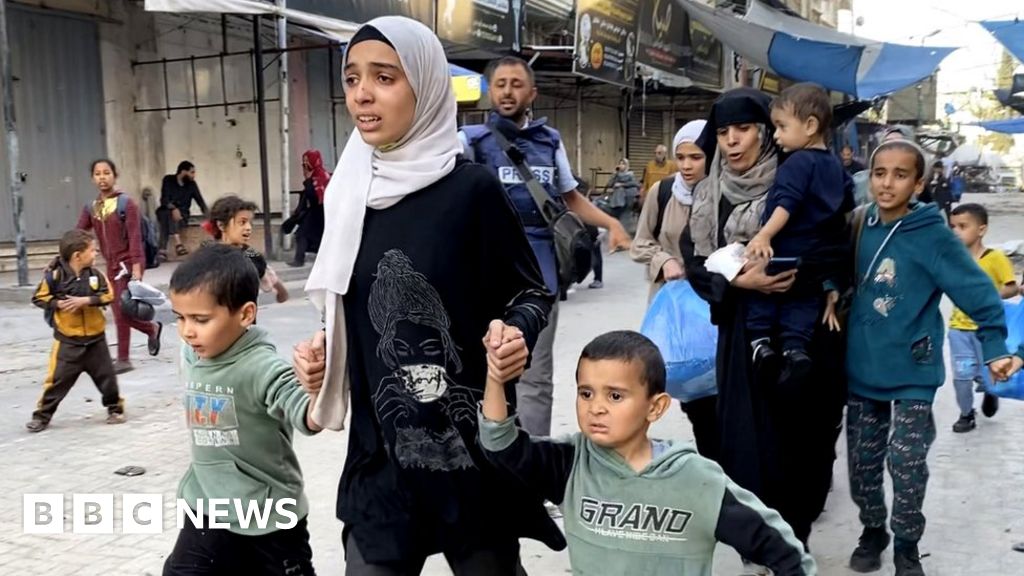There have been desperate scenes in Rafah since the IDF said last Monday that it was beginning a “precise operation against Hamas” in eastern Rafah.
On Saturday, flyers were dropped ordering residents to evacuate more eastern neighbourhoods, including those close to the city centre.
Unrwa’s deputy Gaza director Scott Anderson, who is based in western Rafah, told the BBC on Monday that the Israeli operation now extended “about a third of the way across Rafah” and encompassed the old town.
He said he could hear explosions and air strikes, and that the fighting had affected the operations of hospitals and many of Unrwa’s facilities in Rafah refugee camp, including a primary healthcare facility.
Palestinian media reported that four people, including a child, were killed on Monday in an Israeli air strike on a home in the Brazil neighbourhood, which is just south-east of the camp.
Hamas’s military wing also said it had targeted Israeli forces east of Rafah.
Many people sheltering in central and western areas that are not subject to evacuation orders have also been leaving out of fear that the Israeli operation will soon expand into a large-scale offensive.
Ghada el-Kurd, a mother-of-two, told the BBC on Monday that she had recently fled to Deir al-Balah in Gaza’s Middle Area – the seventh time she has been displaced during the war.
She said the streets of Deir al-Balah were “full of sewage” and that the destruction of homes and infrastructure was “huge, not like Rafah”.
She added: “I’m lucky enough to have a home, but most other people are living in tents and are [suffering from] the heat, a lack of water and a lack of food.”
Deir al-Balah is part of the IDF-designated “expanded humanitarian area”, which stretches north from the coastal strip of al-Mawasi to the city of Khan Younis and Gaza’s Middle Area.
The IDF has told evacuees they will find field hospitals, tents and aid supplies there, but Mr Anderson of Unrwa said it lacked the necessary infrastructure.
In al-Mawasi, he explained, “everything that people have access to has to be trucked in… that includes food, water, moving solid waste”.
“For people who are displacing to Khan Younis it is very similar… That is still recovering from the Israeli operation that took place a few months ago.”
Mr Anderson also appealed to Israel and Hamas to agree to the creation of “fixed corridor” that would allow UN lorries to move safely in and out of the nearby Kerem Shalom border crossing with Israel – a key entry point for aid.
Israel said it had reopened the crossing last Wednesday after closing it for four days due to Hamas rocket fire which killed four Israeli soldiers. But the UN said it was too dangerous to collect aid because of the hostilities in eastern Rafah.
The Rafah border crossing with Egypt has also been closed since Israeli troops took full control of the Palestinian side last Tuesday.
In a statement issued on Sunday, Hamas accused Israel of “escalating their brutal massacres in various areas of the Gaza Strip”.
The UN said that one of its staff was killed and another injured when their vehicle was struck in Rafah on Monday.
Both worked for the UN Department of Safety and Security, the United Nations said in a statement, adding that the “Secretary-General condemns all attacks on UN personnel and calls for a full investigation”. The UN did state who was responsible for the attack.
Meanwhile, US President Joe Biden’s top national security official Jake Sullivan told reporters he does not believe what is happening in Gaza is a genocide.
However, he went on to say that the US believes “Israel can and must do more to ensure the protection and wellbeing of innocent civilians”.
The US was “using the internationally accepted term for genocide, which includes a focus on intent” to reach this assessment, he added.
Israel launched a military campaign in Gaza to destroy Hamas in response to the group’s cross-border attack on southern Israel on 7 October, during which about 1,200 people were killed and 252 others were taken hostage.
More than 35,090 people have been killed in Gaza since then, according to the territory’s Hamas-run health ministry.


